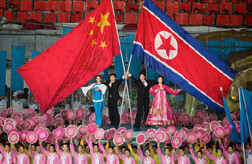Author's note: Less a thesis and more an exploratory probe, this short article is intended as a provocative springboard to an important debate not currently being discussed in adequate measure. As China’s reemergence continues, policy instruments not previously tenable will become realistic options for the Middle Kingdom. Is a nuclear umbrella one of them?
The Grand Bargain: North Korea renounces its nuclear weapons program in exchange for protection under a Chinese nuclear umbrella.
Calls for Beijing to play a more constructive and active role as a responsible member of the international community, especially with respect to the denuclearization of the Korean Peninsula, continue to ring resoundingly throughout global policy circles. Would not this Grand Bargain solve the nuclear impasse on the Peninsula? Would it not also serve to meet both Chinese and North Korean strategic objectives in the region?
For North Korea, a country with little to lose but much to gain, a protection guarantee from China would offer hope for the normalization of relations with the global community; increased economic, food, and energy aid; and an even stronger relationship with the preeminent rising superpower. It would therefore serve to meet the stated goals of its four-pronged Strong and Prosperous Nation policy, which espouses commitment to, and growth in, ideological, political, military, and economic arenas.
Chinese-Korean ties are thousands of years old, with China as a protector figure throughout much of this symbiotic "lips and teeth" relationship ever since Ming Dynasty troops repelled Japan's invasion of the Peninsula in the 1590s. More recently, China has been North Korea's most consistent and steadfast supporter for decades, and its patronage has enabled the North's survival as a sovereign nation. As Columbia University professor Charles Armstrong said in a recent lecture at Renmin University, Beijing, the Korean War created a "blood-cemented friendship" between the two countries—one that is still readily celebrated, serving as a powerful historical memory that continues to shape the bilateral relationship today. Indeed, China is the only country that Pyongyang would trust with stewardship of its nuclear program, and the benefits to both nations of working together toward a grand bargain are substantial.
For China, the alliance would help to meet several important PRC objectives on the Peninsula. First, it would ensure against a Pyongyang regime collapse due to military incursion or complete market failure, and the resulting flood of North Korean refugees across the Chinese border. Second, it would expand Chinese influence in the region and, in particular, guarantee the militarily strategic landmass buffer between China proper and U.S. forces in South Korea. Third, and perhaps most enticing for China’s awakening great-power consciousness, it would offer the opportunity to assume a role reserved for hegemonic powers—that of the nuclear-equipped regional noble who exchanges protection for fidelity.
Moreover, both North Korea and China are in the midst of leadership changes, with Kim Jong Un’s ascension now complete and China’s new top-brass duo Xi Jinping and Li Keqiang poised to assume Communist Party reins. A deal independently struck between Beijing and Pyongyang that solves the North Korea nuclear dilemma, while at the same time outflanking U.S. and South Korean diplomatic and military initiatives, would provide a golden opportunity for the new heads of state to demonstrate their independence from the U.S. sphere of influence while concurrently contributing a significant and propitious chapter to world history.
Naturally, the hurdles to such an agreement are extensive, and whether China wishes to simply maintain the status quo or work toward truly resolving the dangerous instabilities posed by North Korea’s nuclear program remains unclear. Likewise, whether Pyongyang will surrender its most prized military asset remains an open question. Nevertheless, the opportunity for China to play a leading role in creating a safer, more peaceful, and stable world is readily apparent, and is one that, given the history between the two countries, as well as the mutual benefits to be gleaned from such a cooperative, is worthy of consideration. Certainly, as China’s growth continues, the opportunity for certain policy innovations not previously tenable in the Middle Kingdom will become increasingly logical: Is a nuclear umbrella one of them?
The now ubiquitous quote from Admiral Mike Mullen, former chairman of the Joint Chiefs of Staff, urging China to "guide the North, and indeed the whole region, to a better future," suggests unintended consequences: China may decide to meet this responsibility in spades. And while the concept of a Chinese nuclear umbrella may be an unsettling prospect for the U.S. and her allies, denouncing it would prove difficult and startlingly hypocritical. Indeed, this in itself may prove a central impetus to the conclusion of a China-North Korea grand bargain.




